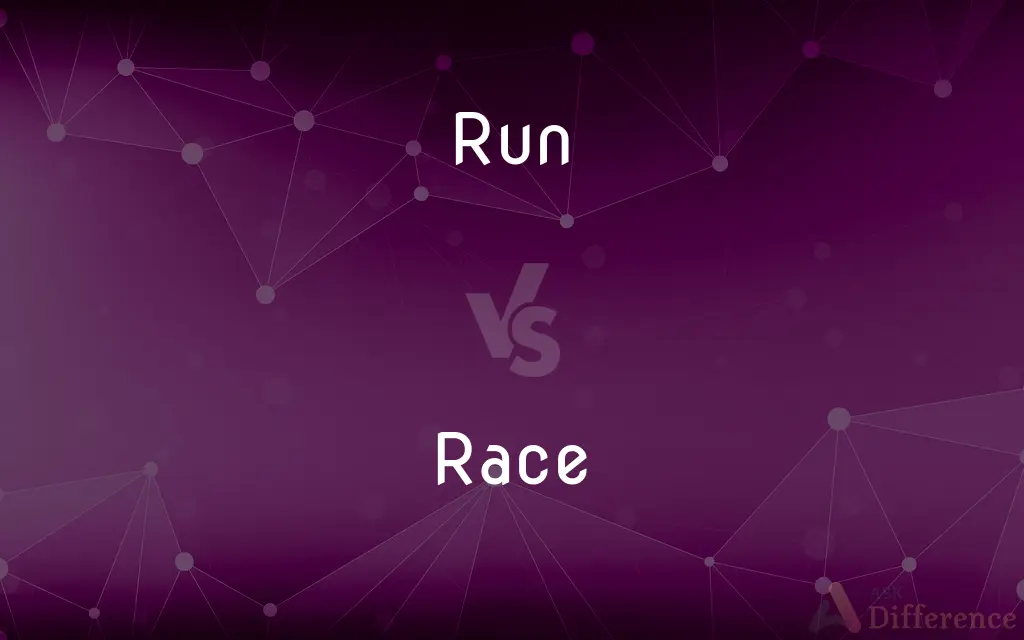Run vs. Race — What's the Difference?
By Fiza Rafique & Maham Liaqat — Updated on February 29, 2024
Running is a method of terrestrial locomotion allowing humans and animals to move rapidly on foot, while racing is a competitive event where participants strive to be the fastest within a set distance or time.

Difference Between Run and Race
Table of Contents
ADVERTISEMENT
Key Differences
Running and racing, while interconnected, serve different purposes and contexts. Running is a fundamental form of physical activity, used for exercise, leisure, or as a mode of transportation over short distances. It's an individual action that can be performed alone, without any competitive aim. In contrast, racing is inherently competitive, structured around the objective of outpacing others to achieve a specific goal, whether in terms of distance, time, or both. Racing requires at least two participants, either directly competing against one another or against the clock in a time-trial format.
The essence of running lies in its accessibility and universality; it's a natural movement that can be executed at various speeds and intensities, depending on the individual's capabilities, objectives, and environmental conditions. Racing, however, introduces elements of strategy, performance optimization, and often, specialized training to enhance speed, endurance, and competitive tactics. This strategic component distinguishes racing from casual running.
Running can be purely recreational, therapeutic, or a form of personal challenge, racing is governed by rules, regulations, and often, formal organization. Races are typically categorized by distance, terrain, and participant type, requiring official timing and adjudication to determine outcomes. This formal structure contrasts with the informality of running for pleasure or fitness.
Running is inclusive, allowing participants of all ages and fitness levels to engage at their own pace and intensity. Racing, while also inclusive, places emphasis on performance, categorization (e.g., age groups, gender, professional status), and achievement, often culminating in rankings, records, and awards. This performance-oriented nature of racing adds a competitive edge to the act of running.
Both running and racing have profound cultural and social impacts, fostering community, promoting health and fitness, and in the case of racing, providing entertainment and spectacle. However, the communal and social aspects of running are more fluid and less structured than those inherent in organized races.
ADVERTISEMENT
Comparison Chart
Definition
Moving rapidly on foot, typically at a speed where both feet are off the ground simultaneously.
Competing in speed to achieve a specific goal within a set distance or time.
Objective
Exercise, leisure, or transportation.
Winning or achieving the best time among competitors.
Nature
Individual activity; can be non-competitive.
Inherently competitive, with structured rules.
Requirements
None, beyond physical ability.
Rules, official timing, and sometimes qualifications.
Participation
Solo or in groups, without competition.
Requires competitors, either directly or against the clock.
Strategy
Varied based on personal goals (e.g., health, endurance).
Focused on optimization of performance and tactics.
Structure
Informal, flexible.
Formal, with categories, regulations, and adjudication.
Social Aspect
Can be communal, fostering social connections.
Competitive, with a focus on community, spectacle, and achievement.
Compare with Definitions
Run
Continuous series of performances.
The play had a successful run on Broadway.
Race
A competition of speed against others.
She won the race with a new personal best.
Run
A method of rapid ground movement on foot.
She goes for a run every morning to stay fit.
Race
A fast-paced challenge against time.
The race against the clock was thrilling.
Run
An act of running as exercise.
Their daily run helps them clear their mind.
Race
An event where participants strive to be the fastest.
The annual 5K race attracts runners worldwide.
Run
To move at a speed faster than a walk.
He decided to run to catch the bus.
Race
A contest of speed in vehicles.
The car race drew a large crowd of enthusiasts.
Run
To operate or be in motion.
The machine runs smoothly after the repair.
Race
To compete in a racing event.
He races for his college's track team.
Run
To move swiftly on foot so that both or all feet are not on the ground during each stride.
Race
A competition between runners, horses, vehicles, etc. to see which is the fastest in covering a set course
Hill started from pole position and won the race
Run
To travel over on foot at a pace faster than a walk
Ran the entire distance.
Race
A strong or rapid current flowing through a narrow channel in the sea or a river
Angling for tuna in turbulent tidal races
Run
To cause (an animal) to move quickly or rapidly
Ran the horse around the track.
Race
A water channel, especially one built to lead water to or from a point where its energy is utilized, as in a mill or mine.
Run
To allow to move without restraint
We like to run the dogs along the beach.
Race
A fenced passageway in a stockyard through which animals pass singly for branding, loading, washing, etc.
Run
To pass over or through
Run the rapids.
Run a roadblock.
Race
Steady or rapid onward movement
The race of time.
Run
To score (balls or points) consecutively in billiards
Run 15 balls.
Race
To compete against in a race.
Run
(Sports) The distance a golf ball rolls after hitting the ground.
Race
Step on it;
He rushed down the hall to receive his guests
The cars raced down the street
Run
Run, stand, or compete for an office or a position;
Who's running for treasurer this year?
Race
Compete in a race;
He is running the Marathon this year
Let's race and see who gets there first
Race
To work as fast as possible towards a goal, sometimes in competition with others;
We are racing to find a cure for AIDS
Race
Cause to move fast or to rush or race;
The psychologist raced the rats through a long maze
Common Curiosities
Are there different types of races?
Yes, including sprints, marathons, relays, and vehicle races, each with unique distances and rules.
Can running improve my health?
Absolutely, running regularly improves cardiovascular health, strength, and mental well-being.
How do I transition from running to racing?
By increasing training intensity, focusing on specific goals, and entering organized races to gain competitive experience.
How do races impact communities?
Races often bring communities together, promote physical activity, and can raise funds for local causes.
What's the best way to prepare for a race?
Tailored training, proper nutrition, and rest are key components of race preparation.
How do I choose a race to enter?
Consider your fitness level, preferred distance, and the race's location and atmosphere.
What distinguishes running from racing?
Running is an act of moving rapidly on foot, while racing is a competitive event focused on speed and performance.
Can running be competitive?
Yes, running becomes competitive in the context of a race where performance against others is measured.
Do you need special equipment for racing?
Depending on the race, specialized footwear or attire may be recommended or required for performance and safety.
Can I race alone?
Time-trials and virtual races allow for solo competition against the clock or remote opponents.
Is racing only for professional athletes?
No, racing events cater to all levels, from amateur to professional athletes.
Can running be part of my daily routine?
Yes, many incorporate running into their daily or weekly routines for exercise and relaxation.
What is the significance of race categories?
Categories ensure fair competition among participants of similar age, gender, or skill level.
What is a pacing strategy in racing?
A plan for how fast to run at different parts of a race to achieve the best overall time.
What is the role of a pacemaker in races?
A pacemaker helps set and maintain a steady speed in a race, aiding competitors in achieving target times.
Share Your Discovery

Previous Comparison
Beans vs. Lentils
Next Comparison
Discuss vs. TalkAuthor Spotlight
Written by
Fiza RafiqueFiza Rafique is a skilled content writer at AskDifference.com, where she meticulously refines and enhances written pieces. Drawing from her vast editorial expertise, Fiza ensures clarity, accuracy, and precision in every article. Passionate about language, she continually seeks to elevate the quality of content for readers worldwide.
Co-written by
Maham Liaqat













































